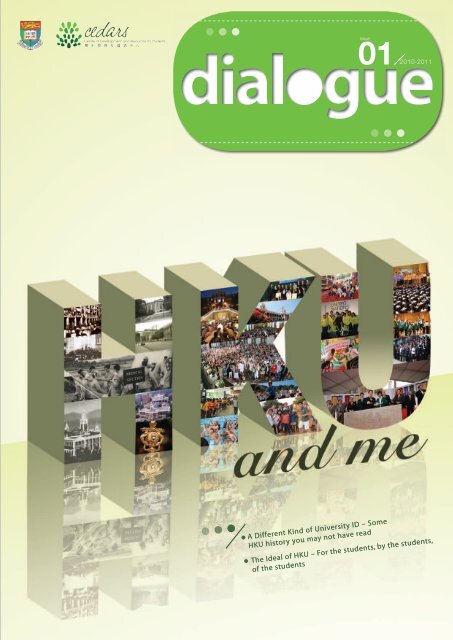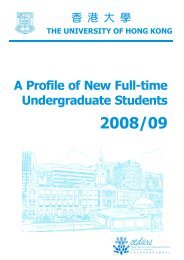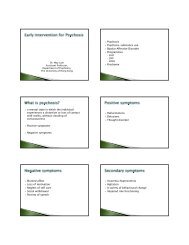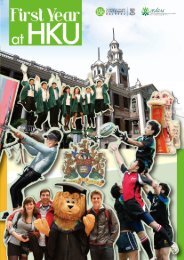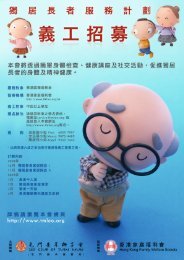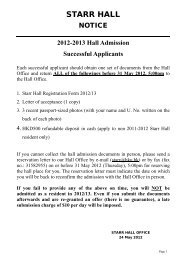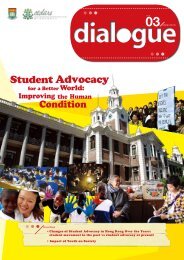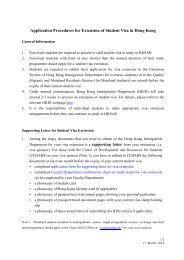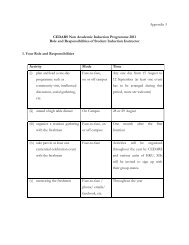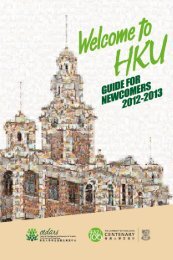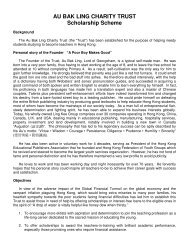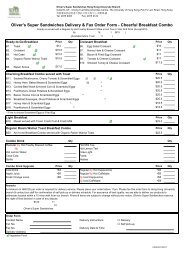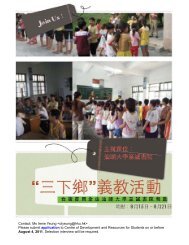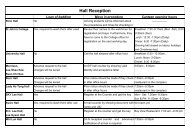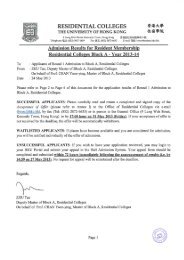Dialogue - Cedars - The University of Hong Kong
Dialogue - Cedars - The University of Hong Kong
Dialogue - Cedars - The University of Hong Kong
You also want an ePaper? Increase the reach of your titles
YUMPU automatically turns print PDFs into web optimized ePapers that Google loves.
pageIn This Issue dialogue01 2010-2011contentsHKU History03 - 05Ideal <strong>of</strong> HKU060708 - 0910 - 11A Different Kind <strong>of</strong> <strong>University</strong> ID –Some HKU history you may not haveread<strong>The</strong> Ideal <strong>of</strong> HKU – For the students, by thestudents, <strong>of</strong> the students<strong>The</strong> Ideal <strong>of</strong> HKU: An ideal <strong>University</strong>through the eyes <strong>of</strong> a Pro-Vice-ChancellorDeveloping your own perspectiveChoosing the ideal lifeKeep your eyes wide openMake use <strong>of</strong> communitiesHave the courage <strong>of</strong> your desireCreate a view <strong>of</strong> life10 HKU People 10 Views12 - 17 Life as a process <strong>of</strong> pursuing dreamsLife <strong>of</strong> self-explorationFrom Our Campus<strong>The</strong> need to spread equality from campusto societyMore than healing handsEarly look at the world <strong>of</strong> workNothing so well worth having as friendsHalls – the start <strong>of</strong> being good timeplannerA heart for promoting Africa at HKUYes, we care!Planning beyond the academic frame18 Message from the Dean <strong>of</strong> Student Affairs19 - 22 Through thick and thinVox Pop23 What do you think is the culture <strong>of</strong>the <strong>University</strong> <strong>of</strong> <strong>Hong</strong> <strong>Kong</strong>?<strong>Dialogue</strong>Published by Centre <strong>of</strong> Development and Resourcesfor Students, <strong>The</strong> <strong>University</strong> <strong>of</strong> <strong>Hong</strong> <strong>Kong</strong>Address3/F & 4/F, Meng Wah ComplexPokfulam Road, <strong>Hong</strong> <strong>Kong</strong>Websitehttp://cedars.hku.hkTelephone (852)2857 8387Email Address cedars-programmes@hku.hkDesignBingo Communication Co.Please circulate this publicationwhen you finish reading
HKU HistorypageA Different Kind <strong>of</strong> <strong>University</strong> ID –Some HKU history you may not have readCecilia KooComparative Literature, Year 3<strong>The</strong>re is no school uniform to wear, but when holding a HKU student ID card in one’s hands, it isalmost impossible not to sense one’s identity <strong>of</strong> being a member <strong>of</strong> the <strong>University</strong>. But apart from thisphysical form <strong>of</strong> identification, there is an alternative way to identify with the <strong>University</strong>: learn its history.<strong>The</strong> past is a part <strong>of</strong> the present, just as students – both freshmen and others – are connected to the<strong>University</strong>’s past.Teaching you some history does not necessarily mean drawing a “time-line”, thus to present analternative history <strong>of</strong> HKU, CEDARS dug out some less-known stories <strong>of</strong> the <strong>University</strong> to tell. So, let’srewind the clock and return to the past!We are knights with wisdom and virtue – Shield and Coat <strong>of</strong> Arms<strong>The</strong> Coat <strong>of</strong> Arms with self-made labels to help readersto understand different parts <strong>of</strong> itShield <strong>of</strong> HKU (Sources: HKU <strong>of</strong>ficial website)You know the Shield <strong>of</strong> HKU: a lively lion above an opened book with the Chinese words “Ming De GeWu” ( 明 德 格 物 ), and a ribbon with the Latin phrase “Sapientia et Virtus”. As mottos <strong>of</strong> the <strong>University</strong>,these phrases carry a similar meaning <strong>of</strong> “wisdom and virtue”. But did you know the design <strong>of</strong> theShield is connected to a knight?Believed to be designed by Western heraldry experts <strong>of</strong> the College <strong>of</strong> Arms in consultation withChinese scholars, the Shield and the Coat <strong>of</strong> Arms present a clear aspiration <strong>of</strong> the <strong>University</strong>: seekinga harmonious balance <strong>of</strong> Western and Chinese cultures. In the Coat <strong>of</strong> Arms, the Shield is “supported”by a Chinese dragon and an English lion, both with Chinese jade collars. <strong>The</strong> application <strong>of</strong> theseanimals is a clear reflection <strong>of</strong> the <strong>University</strong>’s ambition to intermingle the East and the West, in terms<strong>of</strong> enlightening young minds.On the upper part <strong>of</strong> the Shield, the lion on a crimson background is a reference to the College <strong>of</strong>Arms in England. Below it is the opened book, in the colours <strong>of</strong> blue and green. This use <strong>of</strong> thecolours is an allusion <strong>of</strong> the <strong>University</strong>’s location: <strong>Hong</strong> <strong>Kong</strong> Island as green land surrounded by bluesea. At the time when the <strong>University</strong> was built, Pokfulam was on the outskirts <strong>of</strong> the city, with greensurrounds. This allusion is also shown by the green “steep mounts” below the supporters in the Coat<strong>of</strong> Arms.
pageHKU History dialogue01 2010-2011Similar to the Shield, the crest in the Coat <strong>of</strong> Arms is a lion with a Chinese jade collar and the book<strong>of</strong> “Ming De Ge Wu” in its hands, which again shows its Chinese association. <strong>The</strong> helmet andaesthetic ribbons below the crest are a traditional design in heraldry that connects to knighthood, thebattlefield and bravery. In this sense, it is fair to say HKU students are young knights trained with thebest from the West and the East.Rebirth from aftermath – <strong>The</strong> short story <strong>of</strong> the Main BuildingRo<strong>of</strong>-less Great Hall (Sources: An Impossible Dream and Ruins <strong>of</strong> Wars)Sir Freferick Lugard, Chancellor 1911-1912, Governor <strong>of</strong> <strong>Hong</strong> <strong>Kong</strong> 1907-1912 (Sources: An Impossible Dream)Part <strong>of</strong> the floor plan <strong>of</strong> Main Building, designed byAlfred Bryer <strong>of</strong> Messrs Leigh and Orange. (Sources:An Impossible Dream)Sir H. N. Mody, one <strong>of</strong> the biggestcontributors <strong>of</strong> the <strong>University</strong>’sestablishment (Sources: AnImpossible Dream)Tiles in two different styles, marking the darkdays that the <strong>University</strong> had gone through.Main Building, 1912. <strong>The</strong> surrounding was very green.(Sources: An Impossible Dream)<strong>The</strong> Main Building is the <strong>University</strong>’s most representational building. Now, being a member <strong>of</strong> the<strong>University</strong>, how much do you know about this lovely building besides the fact that it is the oldestbuilding in the HKU compound?“<strong>The</strong> Main Building was one <strong>of</strong> the most expensive buildings in <strong>Hong</strong> <strong>Kong</strong> at the time it wasbuilt,” says Dr Peter Cunich from the History Department. It cost $365,000 to build, which was aprincely sum <strong>of</strong> money in the early 1900s. Surprisingly, the <strong>University</strong> was not involved directly in theconstruction. It was Sir Hormusjee Mody who was behind the massive project. Not only did he payfor the construction, he provided his own architect, Alfred Bryer. If Governor Sir Frederick Lugardwas the mastermind behind the establishment <strong>of</strong> the <strong>University</strong>, Sir Hormusjee Mody was the biggestsupporter <strong>of</strong> the project.During the Japanese Occupation, according to Dr Cunich, the <strong>University</strong> was closed and turned intoan emergency hospital. <strong>The</strong> Main Building was seriously looted, and another building was set on fireand became a “disastrous scene”. It took a long time for the <strong>University</strong> to recover; the reconstructionand extension <strong>of</strong> the Main Building was not completed until the 1950s. Today some unique marks <strong>of</strong>this reconstruction remain – the two different kinds <strong>of</strong> tiles used in the main hallways. <strong>The</strong> brown-redtiles are those that survived from the war, and those in surf green were laid during the reconstruction.
HKU HistorySo why were two different styles <strong>of</strong> tiles laid? “It was mainly because <strong>of</strong> the scarcity <strong>of</strong> building materials,”explains Dr Cunich. <strong>The</strong> original tiles were specially produced in England by a particular company, and afterthe war the original materials could no longer be found, thus the different tiles were used.Times were tough but the <strong>University</strong> still managed to hold two congregations in January 1942, including aspecial one to award “wartime degrees” for all graduates. “It was not a formal congregation, it was all done insecret, because the Japanese had already taken over the <strong>University</strong> compound,” says Dr Cunich. It was a “time<strong>of</strong> heroes”; both the campus and the students had witnessed some <strong>of</strong> the darker days in history.We work, we play, we defend – Student culture in the earlier daysFancy Dress Ball in the Great Hall, 1929. Fancy social activity. (Sources: An Impossible Dream)<strong>The</strong> war changed part <strong>of</strong> the outlook <strong>of</strong> the <strong>University</strong>, but most <strong>of</strong> the campus cultures remain – so at leastwe can find similarities between the students in the old days and the present.Diligent students, known as “bookworms”, always existed; they were and are still studious and “examoriented”.In the old days, bookworms were good at “taking notes at high speed”, and library loan recordstell us their favorite readings were the “exam-relevant” ones. Today “high-speed note-takers” remains in thelecture rooms, but now they are using laptops. Weeks before the assessment periods were the peak timesfor libraries to be occupied. However, due to language difficulties, during the 1920s and 1930s there wasa consistently low pass rate; retakes were the norm. In this sense, bookworms were a minority, whereastoday it is comparatively easy to find straight-A students.When the <strong>University</strong> was first established, hall residence was compulsory. Students were able to choosethe life they desired: either studying in rooms all day long, or engaging in activities and social functionsincluding sports, debates and an annual dance. However, these freedoms led to disciplinary problems.Ragging once blackened the image <strong>of</strong> the <strong>University</strong>. <strong>The</strong> most shocking example <strong>of</strong> ragging would bethe “Lugard Hall Incident” in 1931. A student was “bound up and dumped in the hostel coal box byseveral masked students”. Besides punishing the <strong>of</strong>fenders, the seriousness <strong>of</strong> the incident meant the Hallwas closed for a term. <strong>The</strong> incident quelled the ragging problem, but the “hierarchical structure” amongstudents still persists.Our former seniors might have been mischievous, but they were also nationalistic and had a strong socialawareness. A typical indication <strong>of</strong> student nationalism was their strong reaction against the Sino-JapaneseWar in 1937. Slogans like “Buy no Japanese goods” were painted in the <strong>University</strong> compound; the Unionsuspended all activities and volunteer groups such as the Chinese Medical Relief Association were formed.Although large-scale student groups did not last long, they were still vivid evidence <strong>of</strong> student patriotism.Social concern remains a characteristic <strong>of</strong> HKU students – we are active in extra-curricular activities, wecare about our society and nation, and we are willing to defend them in various ways.Sources:C h a n L a u K i t - c h i n g a n dPeter Cunich. An ImpossibleDream: <strong>Hong</strong> <strong>Kong</strong> <strong>University</strong>f r o m F o u n d a t i o n a n d R e -establishment, 1910-1950.Oxford <strong>University</strong> Press: NewYork. (p.1-23, 139-163)Dr David Wilmshurst. “<strong>University</strong>Identity – Background”. AboutHKU.h t t p : / / w w w . h k u . h k / u i d /background.html (RetrievedJune 27, 2010)K o T i m K e u n g a n d J a s o nWordie. Ruins <strong>of</strong> War: A Guideto <strong>Hong</strong> <strong>Kong</strong>’s Battlefields andWartime Sites. Joint Publishing:<strong>Hong</strong> <strong>Kong</strong>. (p.158-159)
pageIdeal <strong>of</strong> HKU dialogue01 2010-2011 Alvin LumBBA(Law), Year 3<strong>The</strong> Ideal <strong>of</strong> HKU – Forthe students, by thestudents, <strong>of</strong> the students“<strong>University</strong> is an important and unforgettable stage in the journey <strong>of</strong> life,” says Pr<strong>of</strong>essor Lap-Chee Tsui. “It is a place for students to learn, and nowadays this includes both academicpursuits and participation in co-curricular activities. Are grades important? Yes, but there areother aspects <strong>of</strong> university life that are just as important.”Pr<strong>of</strong>essor Lap-Chee Tsui,Vice-ChancellorTo Pr<strong>of</strong>essor Tsui, the Vice-Chancellor <strong>of</strong> the <strong>University</strong> <strong>of</strong> <strong>Hong</strong> <strong>Kong</strong>, participation andexposure are given equal weight. <strong>The</strong> means for participation to take place, namely bystudents taking the lead, is a vital means to achieve the end. “HKU is special. Studentledorganisations form an indispensable part <strong>of</strong> campus life. A good number <strong>of</strong> theseorganisations are governed by the Students’ Union, genuinely allowing the students toparticipate in the running <strong>of</strong> the school,” says Pr<strong>of</strong>essor Tsui. He praises these activities forfostering in students the ability and the attitude to deal with “ill-defined problems”.<strong>The</strong> emergence <strong>of</strong> “ill-defined problems” is a new challenge not only to students, butteachers as well. Globalisation and technological advancement have sped up not onlyhuman activities, but also social problems and conflicts. <strong>The</strong> role <strong>of</strong> the <strong>University</strong> has nowbeen redefined from teaching-oriented to providing a total learning experience. HKU has inplace a variety <strong>of</strong> learning opportunities – for instance, internships and exchanges – to betterequip students for an ever-changing world.A university also needs to facilitate student learning, for instance by providing learning spaceand a suitable curriculum, and maintaining an excellent quality <strong>of</strong> teaching. Pr<strong>of</strong>essor Tsui saysin this HKU is constantly striving for perfection and looking forward to providing studentswith a better campus and better learning experience. “<strong>The</strong> new centennial campus is due tobe completed in 2012, and will have more open space and new buildings for teaching andlearning. New students admitted in 2012 will also study under a new curriculum that allowsthem more time and flexibility to arrange their own learning portfolios and to participatein co-curricular activities,” he says. “<strong>The</strong> <strong>University</strong> has continued to recruit outstandingteaching staff on an international basis to support the latest developments.”Pr<strong>of</strong>essor Tsui encourages freshmen to explore their university life to the fullest. “<strong>University</strong>life is more than a continuation <strong>of</strong> high school. Our students will feel like they have moreindependence than before, but it will also be up to them to decide how to make the most <strong>of</strong>their time at HKU. Of course, the adaptation takes time and effort. Whenever they need help,our teachers and counsellors are ready to help them get through this change in lifestyle.”For an educational institute about to celebrate its Centenary, the <strong>University</strong> <strong>of</strong> <strong>Hong</strong> <strong>Kong</strong>has throughout the years been preparing the students <strong>of</strong> today to be leaders <strong>of</strong> tomorrow.Pr<strong>of</strong>essor Tsui attributes the current success <strong>of</strong> HKU to the students’ active participation. “Notonly the current students, but the alumni as well, who have contributed in different forms,such as mentorship programmes,” he says. “Our distinguished alumni share their experienceand provide guidance to our students. This allows the proud tradition <strong>of</strong> HKU to be passedfrom generation to generation.”
Ideal <strong>of</strong> HKUpage<strong>The</strong> Ideal <strong>of</strong> HKU:An ideal <strong>University</strong>through the eyes <strong>of</strong> aPro-Vice-ChancellorCathy KwongDental Surgery, Year 4Rebecca NgArts, Year 2Let us imagine what a “perfect” university should be. What would that consist <strong>of</strong>? Interestinglectures? Less homework? Or perhaps more places for exchange studies and internships?Regarding an ideal HKU, our Pro-Vice-Chancellor and Vice-President, Pr<strong>of</strong>essor S P Chow, hassomething more than that in mind.Starting with our <strong>University</strong> motto, Pr<strong>of</strong>essor Chow systematically illustrates what his ideal HKUincludes. “Our motto says it all – ‘Ming De’ is to have moral conduct, and ‘Ge Wu’ is to haveknowledge and wisdom. Both are needed in our students.” He further explains: “Wisdom,virtue and beauty are frequently mentioned. Wisdom can be achieved through the pursuit <strong>of</strong>knowledge (‘Ge Wu’), and virtue cultivated through seeking moral perfection (‘Ming De’). Onlywith both <strong>of</strong> these will a person achieve the highest ‘beauty’.”Pr<strong>of</strong>essor S P Chow,Pro-Vice-Chancellor and Vice-PresidentPr<strong>of</strong>essor Chow is also concerned about HKU’s mission. “A university should encourageimagination, so that students may discover their potential and surpass their teachers.” Tohim, HKU should provide an environment conducive to the student’s own learning, ratherthan provide the learning itself. HKU should also “go beyond ranking and UGC”. “HKU hasalready built up a good reputation, and the ranking and funds we get will not fluctuate toogreatly. <strong>The</strong>refore these are not the only things we go after,” he says. “Knowledge transfer ismore important – we aim at both bringing talents into the school and transferring our talents tosociety.”Pr<strong>of</strong>essor Chow’s ideal HKU can also contribute to society on the cultural level. “<strong>The</strong> meeting<strong>of</strong> East and West is only the first step,” he explains. “<strong>The</strong> real question is whether we cangenerate something new and better after the cultures have met.” He mentions the present‘clash <strong>of</strong> civilisations’, where both Eastern and Western cultures are proving problematic in theirown ways. In his opinion, HKU is the place where we may take a step closer to solving some<strong>of</strong> these problems, because it gathers cultural talent. Pr<strong>of</strong>essor Chow also mentions a loss inhumility, commitment and compassion in some world leaders today – only by generating a newculture can these traits be restored, and a liberal arts education is helpful for achieving this. “Wecannot only aim to develop <strong>Hong</strong> <strong>Kong</strong> as a financial centre,” he says. “My ideal is that HKU willplay a cultural role in <strong>Hong</strong> <strong>Kong</strong>, in the region and worldwide.”Pr<strong>of</strong>essor Chow also has plans as to how HKU should reach out to the public in the near future.“<strong>The</strong> concept <strong>of</strong> ‘<strong>University</strong> Town’ from other countries is worth considering,” he says. “Weare doing community projects a lot. Utilising students’ knowledge and expertise, we shouldaim at incorporating the community around us as part <strong>of</strong> HKU, while co-ordinating the originaldevelopment required, thus achieving harmony. It can start from developing local culture in astreet nearby.”On top <strong>of</strong> his career as a Pro-Vice-Chancellor, Pr<strong>of</strong>essor Chow has also been a brilliant doctor.“<strong>The</strong> communication skills, rapport and empathy I learned as a doctor help my job as a Pro-Vice-Chancellor. <strong>The</strong>re are lots <strong>of</strong> difficulties to face, sadness to encounter, but these trained meto be optimistic and to maintain a sense <strong>of</strong> humour. Respecting others’ opinion is also importantwhen doing teamwork.” He has been a leader in various capacities, and he is now hoping tocontribute his experience to HKU.
page08 Ideal <strong>of</strong> HKU dialogue01 2010-2011 Winnie ChengHistory & Geography, Year 3Developingyour ownperspectiveDr Yoshiko Nakano,Associate Dean <strong>of</strong> the Faculty <strong>of</strong> ArtsOne <strong>of</strong> HKU’s goals is to provide its students with the skills requiredto become global citizens. Dr Yoshiko Nakano, an AssociateDean in the Faculty <strong>of</strong> Arts with responsibility for outreach anddevelopment, believes that an international learning environmentis essential to this process. With teachers hailing from more thanKeep your eyeswide openCourtney YipEducation, Year 2In this increasingly pragmatic and competitive age, students can no longer secludethemselves from the world. Pr<strong>of</strong>essor Chan Wai-kin, Associate Dean (Student Affairs)<strong>of</strong> the Faculty <strong>of</strong> Science, shares his ideal and quotes the academic world <strong>of</strong> scienceas an instance.“People used to mark boundaries between different scientific fields like Astronomy,Biology and Chemistry, and science students in tertiary education were requestedto choose a particular field and study only that field for three years,” he says.“However, these boundaries are becoming blurred nowadays. <strong>The</strong>re is more and moreinterdisciplinary collaboration at research level, such as with Biochemistry and PhysicalChemistry.”Pr<strong>of</strong>essor Chan Wai-kin,Associate Dean <strong>of</strong> the Faculty <strong>of</strong> SciencePr<strong>of</strong>essor Chan reminds students that extreme specialisation may not correspond withtoday’s society. “In line with the trend, the Faculty has been improving its curricularstructure and content. Science students have to take courses from different disciplinesand fulfill an experiential learning programme,” he says. “All these broaden students’understanding <strong>of</strong> science and various views, and foster independent learning outsidethe classroom. After identifying their majors, they can take more in-depth andspecialised courses in that subject. Students can also seek some academic-relatedadvice from the Advisor Office to help prepare their life-long career.”More importantly, Pr<strong>of</strong>essor Chan says students should first adjust their mindsets tothe colourful and fruitful new life they are leading. As one <strong>of</strong> the top-ranking universitiesin the world, there are vast resources and opportunities. “In the face <strong>of</strong> thousands <strong>of</strong>options, students may easily get lost in searching and unreasoning impetuosity,” hewarns. “It is better for students to identify their interests, evaluate their abilities, usetime management and set up goals that are best suitable for modern need.”
Ideal <strong>of</strong> HKUpage0950 countries and students from almost 80, the HKU campus is atruly an international one. Dr Nakano maintains that this diversityis HKU’s strength, since it allows students to both familiarisethemselves with various perspectives, and develop their own.“At secondary school, students may not always have theopportunity to develop their own perspective on certain issues,and tend to concentrate on learning the right answers for theirexaminations,” she says. “My colleagues in the Faculty <strong>of</strong> Artsencourage students to adopt a different approach to learning; theyinvite students to determine which aspects <strong>of</strong> a question they areinterested in. Students are also likely to discover that there is <strong>of</strong>tenmore than one right answer to any question!”Dr Nakano says the Faculty <strong>of</strong> Arts is continuously looking toexpand its experiential learning opportunities, on and <strong>of</strong>f campus.“For example, there are lots <strong>of</strong> opportunities for students to studyabroad. <strong>The</strong> Department <strong>of</strong> Japanese Studies <strong>of</strong>fers one-yearexchange programmes with selected universities in Japan. <strong>The</strong>seprogrammes allow students to enhance their language skillsand deepen their cultural understanding so that they are able t<strong>of</strong>unction comfortably in a Japanese environment. In 2009, theFaculty also began to develop exchange programmes specificallytargeted at Arts students with universities in the US, UK, Irelandand Germany. <strong>The</strong>se initiatives all contribute to the goal <strong>of</strong>enabling Arts students to become global citizens.”With all this in mind, Dr Nakano <strong>of</strong>fers some practical tips tonew students interested in studying abroad. “First, be alert toopportunities when they present themselves. Second, makesure you are well prepared when you apply. For instance, manyexchange partners only accept students who have a GPA <strong>of</strong> 3.0or above. A strong GPA result cannot be achieved overnight. It isa good idea to attend the orientation session for the programmesyou are interested in during your first year, so that you understandthe requirements.”Choosing the ideal lifeJerran LinJournalism, Year 4Having taught at the <strong>University</strong> for nearly 30 years and witnessed community changes,Associate Dean <strong>of</strong> Engineering Pr<strong>of</strong>essor George Tham observes university life can be aboutindependence and personal development.“More room should be given to students to develop themselves,” Pr<strong>of</strong>essor Tham says. Hedescribes the environment intended by the changes in the engineering curriculum. “It’s upto the students to decide which area to develop.” <strong>The</strong> Engineering pr<strong>of</strong>essor adds he wouldlike to let the students explore themselves more.As required by their pr<strong>of</strong>essional accreditation, engineering students need to completecompulsory courses upon graduation, thus making their timetable <strong>of</strong>ten too packed forelectives. Students may be too restricted to take additional courses within or outside theirfaculty. With the curriculum changes, students not only “broaden themselves”, Pr<strong>of</strong>essorTham says, but they also prepare for life after graduation, which is all about independencetoo, he explains.<strong>The</strong> link between curriculum and independence may be puzzling for some, but this teacherbelieves a more flexible course structure can help students develop the habit <strong>of</strong> selfgoverning.“Students nowadays are more reliant,” he says. “For example, they rely on theteacher or <strong>of</strong>ficial requirements in studies.” He recalls an earlier time when as a student hehad to record notes and find reference materials by himself.Pr<strong>of</strong>essor George Tham,Associate Dean <strong>of</strong> the Faculty <strong>of</strong> EngineeringWith more freedom in the curriculum, students now have to learn to decide things forthemselves, and “try to manage themselves”, Pr<strong>of</strong>essor Tham says. However, with theenvironment now created, “it’s for the students to decide how much to achieve”, heconcludes, adding that everyone has a choice in deciding what is “the ideal life”. “<strong>The</strong> idealis no ideal,” he laughs.
page10 Ideal <strong>of</strong> HKU dialogue01 2010-2011 Make use <strong>of</strong>communitiesWinnie ChengHistory & Geography, Year 3When asked about the ideal <strong>of</strong> HKU, Dr Tony Ferguson, the<strong>University</strong> Librarian, is pleased to share. As one who spends most<strong>of</strong> his time at the <strong>University</strong> for study and work, he believes thatthe <strong>University</strong> is a community <strong>of</strong> teachers and students who cometogether from all parts <strong>of</strong> the world. Students should make use <strong>of</strong>this community, or network, to their benefit, for example with futureemployment.Dr Tony Ferguson,the <strong>University</strong> Librarian“Communities are multi-faceted,” Dr Ferguson explains. “<strong>The</strong>yhave social life, they have culture, they are places where people(left) Pr<strong>of</strong>essor Godfrey Chan Chi-fung,Li Ka Shing Faculty <strong>of</strong> MedicineHave the courage <strong>of</strong>your desireCourtney YipEducation, Year 2Dreams do not always come true, and some people hardly dare to attempt them. Wecan grow used to making excuses, grumbling, spending time in vain and fearing failure.Pr<strong>of</strong>essor Godfrey Chan Chi-fung from the Li Ka Shing Faculty <strong>of</strong> Medicine alwaysshares his story with students and patients to encourage them to pursue theirdreams. One <strong>of</strong> the dreams <strong>of</strong> Pr<strong>of</strong>essor Chan was realised. In May this year hedared to sacrifice his precious hair and turn bald to raise funds for Children's CancerFoundation, together with Pr<strong>of</strong>essor Paul Tam Kwong-hang, Pro-Vice-Chancellor <strong>of</strong> the<strong>University</strong> and Chair Pr<strong>of</strong>essor, Department <strong>of</strong> Surgery and Pr<strong>of</strong>essor Tam’s wife MsAmy Chum, renowned actress and Council Member <strong>of</strong> Children's Cancer Foundation.Pr<strong>of</strong>essor Chan describes his path to medicine as rugged. He studied his first degreein dentistry in the Philippines but he knew that his “burning desire” was medicine, sohe took a few more years to study a medical degree and finally successfully returned topractice in <strong>Hong</strong> <strong>Kong</strong>. Many people would comment on this long path, but he believesit is meaningless to haggle over time or money when it comes to our burning desire. Aslong as you reach the terminal, walking a longer and rougher road is well worth the effort.Most importantly, Pr<strong>of</strong>essor Chan says each person has his own distinct and uniquepath. When we travel our own life path, we attend various independent lessons thatcontribute to who we are now. Every roadblock we come across and fall we haveprovide an invaluable source <strong>of</strong> inspiration and direction in our future journey <strong>of</strong> life, andthis is especially important for students who are still looking for their way. Pr<strong>of</strong>essorChan quotes some lines from a well-known fairy tale, Alice in Wonderland:'Would you tell me, please, which way I ought to go from here?''That depends a good deal on where you want to get to,' said the Cat.'I don't much care where,' said Alice.'<strong>The</strong>n it doesn't matter which way you walk,' said the Cat.Sometimes we need to attempt and experience to help define ourselves and our lives.
Ideal <strong>of</strong> HKUpage11find friendships, they are places where challenges are encountered,and they are places where the individual can thrive or hurt. To me,starting university life is just like a chance to start over, you candecide who you are going to be.”Freshmen most probably will be snapped up by different halls,associations, clubs and activities, which occupy most <strong>of</strong> theirtime. But Dr Ferguson suggests they should make use <strong>of</strong> thelibrary system to read more. “Most <strong>of</strong> our fresh students havebeen required to memorise things for examinations and are tired <strong>of</strong>reading. Now is the time to decide what to read independently, justfor fun, just to become educated in things which are <strong>of</strong> personalinterest.”He shares his own experience on how he would reward himself forworking hard as a young student. “When I was a freshman, I wouldreward myself after studying for an hour the materials I would betested on, by reading something fun. After 15 minutes <strong>of</strong> doingwhat I wanted, I would return to the study <strong>of</strong> what others wantedme to learn.”Apart from the community <strong>of</strong> teachers and students, thereis also a huge community in the library – the community <strong>of</strong>scholars and writers. Dr Ferguson suggests a special activity forstudents to do in the library, so as to enrich knowledge. “Youcould start anywhere in the library and do the following: walk upto a bookshelf and scan the titles. Pull an interesting title out andread it for at least 10 minutes. If it is really interesting, finish thebook. Otherwise, put the book back, and then the next. Or ona different day, come back to the same shelf but then walks 10steps to the right and do the same thing again.”Create a view <strong>of</strong> lifeWinnie ChengHistory & Geography, Year 3Lee Shau Ki Hall Warden Simon Lo believes that university is a stepping stone to society.<strong>University</strong> education provides students with knowledge, but also helps students tocreate a view <strong>of</strong> life. He recommends students read "<strong>The</strong> Dance <strong>of</strong> Leadership" (PeterCammock), which is about the importance and emphasis <strong>of</strong> "soul" in helping to solveleadership problems."Soul may be difficult to explain here, but you can treat it as a foundation to a goal. Onceyou have the foundation, you will find passion, you will meet friends with the same goalas you, and find your way. You can also apply it in your career. Let’s say if you are goingto be a doctor, you are going to be a conscientious one with ‘soul’. It is sad that someuniversity students acquire knowledge, but still feel lost and cannot find their way."Simon believes that hall education helps students to build up their own view <strong>of</strong> life.“Students will grow up through difficulties. In hall, they will have many experiences inorganising hall activities. Sometimes they will face criticism. Through these criticisms andcomments, they will build up their own view <strong>of</strong> life, as well as find their true friends.Simon Lo,Lee Shau Ki Hall WardenSo how should students balance their time? Simon believes that hall life is not a separatepart <strong>of</strong> your life, instead it is one part <strong>of</strong> it. So it is not only a matter <strong>of</strong> time management,but also the management <strong>of</strong> life, among family, friendship, study, relationship and career.<strong>The</strong>n how should we be prepared to adapt to university or hall life? Simon suggests thatstudents keep an open attitude to new things, and learn to appreciate them. “Thingshappen here that are not the same with secondary school anymore. You should enjoyand appreciate the change instead <strong>of</strong> keeping everything unchanged. You should notcopy your past here, instead you should share it with others.”
page12 10 HKU People 10 Views dialogue01 2010-2011Life as a process <strong>of</strong> pursuing dreamsRebecca NgArts, Year 2Hippo Yam Chit-hong gained his Bachelors Degree in Civil Engineeringin 2001. He has pursued further studies in Aerospace Engineering andis now residing in the Netherlands because <strong>of</strong> his career as a researchfellow for the European Space Agency.<strong>Dialogue</strong>: How did you choose your major in HKU?Hippo: I have always wanted to study Aerospace Engineering. But thisis not provided in <strong>Hong</strong> <strong>Kong</strong>, so I chose Civil Engineering instead. <strong>The</strong>reare considerable differences between the two, and Civil Engineeringis useful to my present career only to a certain extent. Actually, a lot <strong>of</strong>factual knowledge learned in university may not be directly useful to one’scareer. Nowadays, many people pursue careers that are very differentfrom their undergraduate majors. <strong>The</strong>refore, in university, gaining skillsand establishing a network with people you meet are more importantthan gaining knowledge.<strong>Dialogue</strong>: Can you tell us more about your experience in joining theIntensified Learning Opportunities Programme (ILOP) organised byCEDARS? How have you enriched your campus life besides joiningILOP?Hippo: I joined ILOP towards the end <strong>of</strong> Year 2. Under ILOP, I went toQinghua <strong>University</strong> for a month. Back in <strong>Hong</strong> <strong>Kong</strong>, I visited factoriesand commercial organisations, and participated in an adventure campwhich had trained my teammates and I to co-operate as a team. I havebuilt lasting friendships with them through this programme.Life <strong>of</strong>self-explorationRebecca NgArts, Year 2Winnie Chan (Hippo’s wife) gained her Bachelors Degree inBBA(Accounting and Finance) in 2001. She later changedher major to Early Childhood Education and ExceptionalNeeds and completed a teaching Licence Certificate in theUS. She is currently a stay-at-home mum, taking care <strong>of</strong> herbaby daughter.<strong>Dialogue</strong>: You have pursued a career that is verydifferent from your undergraduate major. Why is that?Winnie: When I chose my major in HKU, I didn’t really knowwhat my real interests were. I only knew that I liked jobs thatgave me a chance to meet people. For me, self-explorationdidn’t start until after graduation. It was when I joined myhusband in the US that I had the chance to learn aboutcourses on children’s education. After carefully readingabout every course there was to <strong>of</strong>fer, I found that this iswhere my real passion lies. However, I have never regrettedstudying for the BBA in HKU. I found that even working withchildren requires skills from a BBA, like managing funding forkindergartens. So, even if what you study does not interestyou, don’t feel discouraged – there must be somethingworth learning in your major!<strong>Dialogue</strong>: How did you feel when you first joined HKU as afreshman?Winnie: I found Year 1 quite a transition from secondary school. BeforeYear 1, things were already planned for me. In university, you are suddenlyso free to make your own choices. I could even choose for myself as towhether I wanted to attend lessons! For a short while, I wasn’t too surehow to make choices. I needed time to adapt to this new pattern <strong>of</strong> life.Nevertheless, I found school life enjoyable not long after that.<strong>Dialogue</strong>: Do you place studies as a high priority?Winnie: Yes. Studies are important, and I had quite a high standard formyself. Good results are necessary for graduation. I required myself not toskip lessons for most <strong>of</strong> the times, and I handed in all homework on time.I’ve found this manageable even though I had other activities to attend.Of course, students have to remember that university life is not just aboutstudying – your undergraduate years are precious, and do remember tohave fun and gain different experiences. Don’t waste the time!
10 HKU People 10 Viewspage13Besides ILOP, I have joined some activities organised by student societies, like the stargazing camp, and attendedtalks by distinguished alumni or pr<strong>of</strong>essionals. I attended General Education courses, too.<strong>Dialogue</strong>: Were you ever overwhelmed by dealing with extra-curricular activities and study?Hippo: Exams were most stressful to me. I didn’t feel too overwhelmed during most other times. <strong>The</strong>re wereindeed hectic days, and I skipped a few lessons then – but I have always made sure that I could get back acomplete set <strong>of</strong> notes for the lesson I’ve missed. <strong>The</strong> most important thing is to prioritise and know what youreally want in your university life!<strong>The</strong> need to spread equalityfrom campus to societyRebecca NgArts, Year 2Billy Yau gained his Bachelors Degree in Education (English)from HKU in 2008, and has been a secondary school teacher ever since. Being visually impaired, he haslots to say on opportunities for the disabled in the <strong>University</strong>, and in society.<strong>Dialogue</strong>: Being visually impaired, how was university life for you?Billy: I joined activities that do not necessarily require eyesight. I attended hall gatherings, joinedathletics, swimming and the choir. Lecturers were very supportive in helping me fight for a teaching jobin mainstream education for my internship. <strong>The</strong>y believed that even the visually impaired can teach well.HKU is the place that made me confident enough to step into society!<strong>Dialogue</strong>: When students come across a person with a physical disability in HKU, what shouldbe their attitude in getting along with them?Billy: We’ve got to know that everyone is “disabled” in some way – it’s just that physical disabilities aremore apparent. That’s why we shouldn’t classify anyone as “ordinary” or “extraordinary”. Treat us asyou’d treat anyone else! <strong>The</strong>re are only minor issues as to how we communicate – for example, I can’tsee when you nod your head, and I need you to lead my way.<strong>Dialogue</strong>: <strong>The</strong> media may say that the disabled <strong>of</strong>ten face greater difficulty than others if they want to succeed in anything. Isthis true?Billy: Whether it is more difficult for us to achieve our goals depends on whether the goal is related to our disability or not. If it isn’t,there’s no problem in achieving it. For example, in my teaching career, does the fact that I cannot see students really hinder teachingand learning? Difficulties I encountered in teaching <strong>of</strong>ten come from the school’s poor arrangements and lack <strong>of</strong> confidence in me,not from my disability. A sad reality is that we <strong>of</strong>ten find it difficult to realise our goals not because <strong>of</strong> the disabilities themselves, butbecause society does not give us enough chances. But time is really needed for society to change its perception!
page14 10 HKU People 10 Views dialogue01 2010-2011More than healinghandsCathy KwongDental Surgery, Year 4Ada Ng, now working as a surgeon in urology, participated in lots <strong>of</strong>activities during her life as a HKU student. Apart from being an elitein the swimming team, leading the team, contributing to the SportsAssociation, joining athletics, playing hockey and joining choir teams inhall, she also helped in many community services, from giving childrenswimming lessons nearby to overseas voluntary work. She has been toTsinghua <strong>University</strong> in Beijing as part <strong>of</strong> an ILOP programme in Years 2and 3 to help in the countryside, to Guizhou during Year 4 to plan theconstruction <strong>of</strong> a school, and to New Delhi in India during Year 5 to givehealth education as part <strong>of</strong> her studies.<strong>Dialogue</strong>: When you were a student, you were involved in lots <strong>of</strong>extra-curricular activities apart from your tight learning schedule.What motivated you to take them up and how did they make youruniversity life more fruitful?Ada: I love swimming because it brings me a strong sense <strong>of</strong> teamspirit – through training together, we achieve a final goal. <strong>The</strong> servicesI took part gave me chances to educate others and give myself to thecommunity. Programmes like ILOP, and teams I took part in with hall andcampus, also broadened my horizon a lot.<strong>Dialogue</strong>: What experiences throughout your university life affected youthe most in your future planning?Ada: <strong>The</strong> experiences <strong>of</strong> serving the community made me understand theneeds <strong>of</strong> under-privileged groups in society and enhanced my sense <strong>of</strong>commitment. By taking part in project planning on social services, I wastrained in terms <strong>of</strong> organising tasks and leadership, which were all useful tomy future.<strong>Dialogue</strong>: What is your advice to students to make university life moreenjoyable?Ada: As HKU provides lots <strong>of</strong> activities for students, it is not simply a placefor study. Of course studying should be <strong>of</strong> utmost importance, but studentsshould also utilise the opportunities to explore new things like sports, tomeet new friends from different faculties, to gain international exposure, tolearn new skills (e.g. Putonghua), and even to join executive committeesand social services.Early look at the world <strong>of</strong> workWinnie ChengHistory & Geography, Year 3Some may think that it’s not the right time for new students to start career planning on their freshstart at the <strong>University</strong>, but the internship experience <strong>of</strong> Lau Hing-lung, a graduate <strong>of</strong> Economics andFinance now working in Australia as a trainee underwriter, may give us another insight.<strong>Dialogue</strong>: How would you describe your university life?Hing-lung: <strong>University</strong> life is fun and HKU has many interest groups and clubs to fulfill my demands.Some courses in HKU had projects that were really tough, but all these turned into good memoriesand strong friendships after my colleagues made the endeavour. <strong>The</strong> end result might be terrible, butthat is what makes it more memorable!<strong>Dialogue</strong>: Can you tell us more about your internship experience organised by CEDARS?Hing-lung: In the summer after Year 2, I joined an entrepreneur programme organised by CEDARS and worked in Scotlandfor two months. I was working on two environmental-related projects for a Scottish s<strong>of</strong>t drink company and a waste-recyclingcompany. This was a multinational programme and I worked with students from different countries, namely the US, Spainand Russia. At the moment, I find a strong linkage between my current job as an underwriter, since it requires a broadunderstanding <strong>of</strong> different industries and an appreciation <strong>of</strong> globalisation.<strong>Dialogue</strong>: Can you give some advice to fresh students about how to plan their university life and theirfuture career?Hing-lung: Enjoy your university life and do whatever you are truly passionate about. Money should not be aconcern when you pick a career at this stage, as this is what comes along later when you get more experience andskills in a career. Preparation is always important, as it is what makes your career when opportunities coincide. In theend, you may end up in something so exciting and meaningful that you never expected!Honestly, I did not plan my career that early. I did not even know what "i-banking" was until Year 3, when I realisedall the career talks in HKU were packed. If I could choose again, I would definitely apply for a freshman internshipfrom CEDARS after the first year, as this would give me an advantage <strong>of</strong> an earlier real-world work experience,which would enable me to understand what kind <strong>of</strong> career I really like.
10 HKU People 10 Viewspage15Nothing so well worthhaving as friendsCourtney YipEducation, Year 2Manda Zhu Wenbai, a Year 2 accounting and finance student from Shanghai, lookedback on her first year and would like to share with her fellows some good ways to adaptto life in HKU and <strong>Hong</strong> <strong>Kong</strong>.<strong>Dialogue</strong>: How did you adapt to the life at the <strong>University</strong>?Manda: <strong>Hong</strong> <strong>Kong</strong> has been notable for its crowded array <strong>of</strong> buildings and fast pace<strong>of</strong> living, and the <strong>University</strong> is no exception. I always have to squeeze into a crowdedlift and twist through a maze-like campus. Every person flashes by at high speed. <strong>The</strong>environment and culture definitely demand a certain period <strong>of</strong> time to adapt to, and puta great deal <strong>of</strong> stress on foreign students. I think the best way to adapt is to meet morefriends, especially friends from the same origin. It is always easier to share your joy,views and concerns with someone who is empathetic.<strong>Dialogue</strong>: What is the most impressive part <strong>of</strong> your university life?Manda: I would say the whole experience at the <strong>University</strong> is impressive, as opportunities are everywhere! To me, I met manypeople when I did school group projects, visited firms and joined an exchange programme. I have learned a lot, especially with mycommunication skills, as I have to co-operate with other students and take the initiative in contacting businessmen. Likewise, I hadlots <strong>of</strong> fun and gained a better understanding <strong>of</strong> other cultures.<strong>Dialogue</strong>: What is your advice to Mainland students like yourself?Manda: Be active. As I mentioned, opportunities are everywhere. Many foreign freshmen first come to the <strong>University</strong> as strangersand feel helpless and bewildered. It is better for them to find and ask some experienced senior students and teachers. Things willturn out smoothly if you can learn from experience.Halls – the start<strong>of</strong> being goodtime plannerAngie LeungArts, Year 3Brian Liu Ming-tak, an LLB student, has a dynamic life as a member <strong>of</strong> HKU. Halllife is challenging to many students. As a member <strong>of</strong> hall, Brian shed some lighton how he has been striking a good balance between hall and other parts <strong>of</strong> hisuniversity life.<strong>Dialogue</strong>: How would you describe your university life? What is the mostimpressive part <strong>of</strong> it? What have you gained most from it?Brian: I would describe my life at <strong>University</strong> as fruitful. Studying is not the onlypart <strong>of</strong> my university life. I was a member <strong>of</strong> the debating team in Years 1 and 2,representing HKU and taking part in competitions held in Malaysia and Ireland. Inthese competitions, I cherished every chance to meet new people. Throughoutuniversity, I am amazed to see so many people showing such dedication toextra-curricular activities (ECAs), like the hall hockey team I joined, and studentassociations. People here are not just passionate about their studies. I cannot denymy hall life is the thing that I treasure most here. I have met many wonderful peoplewith various backgrounds there, and I am really touched by how we all support oneanother to face each day’s challenges.<strong>Dialogue</strong>: How do you manage your hall life andacademic results? After three years <strong>of</strong> study, doyou feel satisfied with HKU?Brian: I have lived in hall since I began at HKU,so that’s two years. Apart from studying, I am alsoa hockey player. Last year I was a member <strong>of</strong> the<strong>University</strong> debating team and the hall current affairssubcommittee. I also spent some time running thehall photographic dark room and taking photographsfor hall sports teams. In order to balance this with mystudies, I did have to make some sacrifices. At theend <strong>of</strong> Year 2, I quit the debating team and focusedmore on studying. I was from an international schooland most <strong>of</strong> my friends went overseas for university.With my friends all gone, I did not expect to enjoyuniversity life. But I have to admit, I am satisfied withHKU so far. <strong>The</strong> classes are interesting and I havegained a lot from the ECAs I joined.<strong>Dialogue</strong>: Can you give some advice to freshstudents on how to plan for their university life,and their career?Brian: One thing to bear in mind is that universitydoesn't last for a very long time, and one shouldcherish every opportunity to take advantage <strong>of</strong> it. So Ithink it’s important to make the best use <strong>of</strong> what freetime you have – for me, that’s in hall life. About careerplanning, I would say, grab every chance from HKUteachers and students and ask more about careerpaths. It is important to be proactive and start searchingfor summer internships several months in advance.
page16 10 HKU People 10 Views dialogue01 2010-2011A heart for promotingAfrica at HKUAngie LeungArts, Year 3Simbisai Mandizvidza (Sambi), a Zimbabwean student who is studying Accounting and Finance, shared with usher experience at HKU as an international student and her advice to fresh students.<strong>Dialogue</strong>: How would you describe your university life? What have you gained most from it?Simbi: I would describe my life at HKU so far as exciting, challenging and above all, really fun! What I loveabout being an African college kid in Asia is that my world view is constantly being expanded and I’m alreadybursting with business ideas that I can take back to Zimbabwe. What I’ve gained most from HKU is greaterself-confidence. Between in-class presentations and Global Lounge events my “stage fright” is now quitemanageable! I feel blessed to be at HKU. It has far exceeded my expectations. I’ve learned so much from mypr<strong>of</strong>essors and classmates. <strong>The</strong> competitive learning environment has challenged me to be a better studentand a stronger person. I haven’t seen anything like Global Lounge events in Zimbabwe, so I hope to beinvolved in them more! I plan to take advantage <strong>of</strong> the various opportunities available at HKU for the rest <strong>of</strong> mytime here, and <strong>of</strong> course to enjoy the ride!Yes, we care!Alvin LumBBA(Law), Year 3Martin Kok is a law student currently in his fifth year <strong>of</strong> study. He wasthe Vice-President (External) <strong>of</strong> the Students’ Union. Martin has beeninvolved with the <strong>Hong</strong> <strong>Kong</strong> Federation <strong>of</strong> Students ( 學 聯 ), and has alsobeen supporting Tertiary 2010 to fight for universal suffrage and justicewithin society.<strong>Dialogue</strong>: How does a university environment motivate you toparticipate in social movements?Martin: <strong>The</strong> <strong>University</strong> programmes and other courses have equippedme with good foundations in this respect, such as some short courses inhuman rights or international criminal law. More importantly, the <strong>University</strong>provides a platform to voice out our concerns and to create change insociety.<strong>Dialogue</strong>: Do you agree students nowadays are less proactivein participating in social movements? Do you have any adviceto your fellow students in this regard?Martin: <strong>The</strong> situation is improving. We do see more post-1980sgeneration, who are pioneering more and more social campaigns.Let’s hope this is sustainable and rational. I believe university studentsshould be more critical and analytical towards social problems –university is more than a vocational training centre.<strong>Dialogue</strong>: What is the most impressive experience you have hadin various social campaigns?Martin: It must be the Students’ Union’s June 4 20th anniversary events.I realise that students do voice their support to the pursuit <strong>of</strong> justice andhuman rights, especially in critical moments. <strong>The</strong>re are pressures fromconservatives or even from the public, but we are united and determinedto uphold these universal values. <strong>The</strong> impact, in terms <strong>of</strong> both numbersand the attention aroused in and outside <strong>of</strong> campus, is overwhelming.
10 HKU People 10 Viewspage17<strong>Dialogue</strong>: Have you lived in Hall? How was it? How did youmanage your hall life and academic results?Simbi: I lived in Starr Hall for one year. I liked staying there becauseI got the opportunity to live with people from all over the world. Wehelped each other with assignments (Cantonese is quite different frommy native language Shona), chatted in the pantry and had fun at hightable dinner! <strong>The</strong>re’s always something going on in the Hall so I doschool work first and try to keep my evenings free for hanging out withfriends or participating in hall activities.<strong>Dialogue</strong>: Can you give some advice to fresh students abouthow to plan for their university life, and their career?Simbi: I would advise freshmen to do what they’re best at and what’sfun for them, instead <strong>of</strong> trying to be “careerists”. As Mahatma Gandhisaid, "Live as if you were to die tomorrow. Learn as if you were to liveforever". I, for example, realised how the media coverage <strong>of</strong> Africa isusually negative and decided to organise the Africa Business Forumin January and March. I wanted to show that Africa is not a place <strong>of</strong>poverty, but rather a land <strong>of</strong> boundless opportunities for those whohave vision and passion. I hope to use my time at HKU promotingAfrica; its natural beauty, rich culture and amazing people!Planningbeyondthe academicframeCathy KwongDental Surgery, Year 4Billy Ko, a Bachelor <strong>of</strong> Science graduate <strong>of</strong> ComputationalMathematics and Operations Research, has explored his career in amost vibrant and energetic way since he left HKU in 2001.Billy first worked in an IT company, and has since developed hisown businesses including a music company, publishing company,photographic studio and travel media company. He did not run thesecompanies simultaneously, nor did one evolve into another – thereare over-lapping times between businesses, because each one issomehow related to the others, according to Billy.Finally he discovered that he is most interested in travelling, so hedecided to focus his career on this. Currently he is involved with apopular travel website called “travellife” (www.travellife.org). Billy isalso running a mainland travel agency.Just describing his busy career development is exhausting! Studentscan sometimes be concerned as to whether there is a directcorrelation between their studies and future careers. Billy, definitely an ideasman, shares his own thoughts about this with us and reminds that, in theend, you must choose what you feel is right for you.<strong>Dialogue</strong>: What do you think about the relationship between theacademic knowledge you attained and your career development?How did your university life make you more ready for your futurecareer?Billy: Not all the academic knowledge we gain in university applies toour future careers, but the most important thing is the critical and logicalthinking we are trained in through our studies. I participated in a lot <strong>of</strong>activities, from Hall to getting into an Ex-co, to programmes like AIESEC(the world's largest student-driven organisation), mentorship initiativesand so on. Through them I knew lots <strong>of</strong> new people – including seniorand junior ones. Knowledge exchange between people has helped me alot. <strong>The</strong>refore, students should keep training their minds, and try as manyvarieties <strong>of</strong> activities as possible in their university lives.<strong>Dialogue</strong>: How did you benefit from the resources provided byHKU and did they prepare you for challenges in your life after yourgraduation?Billy: <strong>The</strong> extra-curricular activities were invaluable to me. <strong>The</strong>y providedme with the chances to maintain good connections with people I met, evenafter graduation. <strong>The</strong> connections made me realise how large (and small)the world is. Also, HKU provided a great deal <strong>of</strong> flexibility and freedom to meand my fellow students, which meant we had opportunities to get involvedin other aspects <strong>of</strong> a rich university life, apart from the academic studies.<strong>Dialogue</strong>: What factors influenced you when you were making yourcareer choice?Billy: I did not choose my career immediately after graduation. It wasimportant for me to dare to try different jobs and try changes until thesuitable one came along. I gained the experiences to develop my ownbusiness through these changes. It took time to develop my hobbies andgoals, but they were my greatest concern when choosing my career.
pageFrom Our Campus dialogue01 2010-2011Message from the Dean <strong>of</strong>Student AffairsDear Students,On behalf <strong>of</strong> HKU, I would like to welcome you to or back to HKU. I hope you had a fruitful andenjoyable summer in which you are fully “recharged” for the busy academic year ahead.For the new students, may I once again congratulate you for coming to HKU. I commend you for your excellent academic and non-academicachievements that earn you a place here. I am sure you will excel further at HKU.As some <strong>of</strong> current students know, HKU has significantly revamped its undergraduate curriculum to prepare itself for the transition from the3- to 4-year system in 2012. In fact, we are not waiting until 2012. We have incorporated many essential features <strong>of</strong> the new curriculum intothe existing 3-year curriculum and the freshmen this year will go through a brand new curriculum. Aside from pr<strong>of</strong>essional and academicexcellence, the new curriculum aims to develop students’ abilities in critical intellectual inquiry, tackling novel situations and ill-definedproblems and communication and collaboration.As our graduates are likely to be operating in a globalised world, the new curriculum contains components that will cultivate a high level<strong>of</strong> intercultural understanding among them. Perhaps, above all, students will develop global citizenship, leadership and capabilities inadvocating for the improvement <strong>of</strong> the human condition. We believe the new curriculum will better prepare students to make the best use <strong>of</strong>their outstanding abilities and talents to work together with young people from all over the world to tackle global problems that confront all <strong>of</strong>humankind.Other than the new curriculum, many <strong>of</strong> you will witness a few important historical events <strong>of</strong> HKU. <strong>The</strong> <strong>University</strong> will celebrate its Centenaryin 2011-12, in which students will play a significant part. Although we have a framework for the celebration already, we will continue toconsult you in the new academic year. In 2012, many <strong>of</strong> you will be the first users <strong>of</strong> the Centennial Campus and the new student residenceson Lung Wah Street in Kennedy Town. I am sure you will agree with me that it is a very exciting time to be at HKU. We count on yourcontribution to make these events successful.To complement the formal curriculum, the Centre <strong>of</strong> Resources and Development for Students (CEDARS) and many other units <strong>of</strong> the<strong>University</strong> have put together a variety <strong>of</strong> courses, workshops and leadership programmes for your full development. I hope you will take thetime to study the relevant brochures or posters when they come out. I will also encourage you to take “Psychometer”, which is an onlinequestionnaire for students to identify their character strengths. Of course, you are welcome to come to CEDARS to chat with our studentadvisers on various aspects <strong>of</strong> your study life at HKU.In addition, HKU also has a number <strong>of</strong> programmes that put you in close contact with the community. For instance, in the HKU MentorshipScheme, you will have a chance to get to know a community leader and exchange life experiences with him or her. In the HKU WorldwideExchange Programme or other overseas study programmes or internships, you will learn about the world and expose yourself to thoughtsand cultures that are totally new to you.Other than joining activities organised by the <strong>University</strong>, it is also important for you participate and assume leadership positions in studentsocieties. This is a good way for you to start to serve and create opportunities for other people while you are still studying.Finally, may I wish you a successful year ahead. Please feel free to send me an email at dosa@hku.hk if you have any suggestions, questionsor comments that you want to share with me.Best wishes,Albert ChauDean <strong>of</strong> Student Affairs
From Our CampuspageThroughthickand thinNelson SiuBBA(Law), Year 5HKU –Resources & SupportAcademic AdvisingNeed some academic-related advice andsupport? Check out the support servicesand resources available athttp://www.hku.hk/tlearn/advising.Computing and Network ServicesStudying without a computer is no longerpossible. Hang out at any <strong>of</strong> the ComputerCentres on campus if you need to use acomp, or access the <strong>University</strong> network.<strong>The</strong> Computer Centre is the provider <strong>of</strong>central computing and network services.<strong>The</strong> Help Desk is in Room 104, Run RunShaw Building. <strong>The</strong> electronic helpdeskaddress is ccbox@hku.hk. You can alsovisit http://www.hku.hk/cc for technicalsupport.From Our Campus:Where you can always findsupportNew beginnings are alwaysexciting, but also a little nerverackingbecause you are venturinginto the unknown. By the sametoken, going to university is anexciting new adventure but becauseyou will be exposed to an unknownenvironment, you will inevitably bea little lost. Fear not, my freshmanfriends, the <strong>University</strong> <strong>of</strong>fers manyresources that will stick with youthrough thick and thin. Take a lookat the following and feel free tomake use <strong>of</strong> any <strong>of</strong> them!Academic Matters,Awards and Scholarships<strong>The</strong> Student Connect system is kind <strong>of</strong> likethe ring in the trilogy Lord <strong>of</strong> <strong>The</strong> Rings – itis where you can monitor and rule over allyour personal particulars: course enrollment,examination timetables and all otherpersonal academic matters.(http://www.hku.hk/connect)To all the geniuses and smartypants outthere, go find yourself a scholarship, prizeor academic award. <strong>The</strong>re are a variety <strong>of</strong>awards and scholarships available at HKU tohonour modern day Newtons and Einsteins.(http://www.hku.hk/tlearn/advising/fsf)Exchange ProgrammesYo u d o n o t h a v e t o s p e n d a l l y o u rundergraduate years in HKU. You can go onexchange and study abroad if you meet theexchange requirements. <strong>The</strong> HKU WorldwideExchange Programme <strong>of</strong>fers one semester/one year overseas exchange to non-final yearundergraduates (http://www.hku.hk/liaison/oise).If you want to tap into the growing opportunities<strong>of</strong> the Chinese market you can join the HKUWorld Wide China Programme, which <strong>of</strong>fersexchange and internship opportunities over thesummer (http://www.hku.hk/cao).General EducationIntelligence has many forms. At HKU, theGeneral Education programme aims todiversify the learning experience so thatstudents can acquire cultural and artisticintelligence, improve their critical thinkingskills, ethical reasoning and personalcompetencies (http://gened.hku.hk).
page20 From Our Campus dialogue01 2010-2011HealthYou cannot reach your potential if youare unhealthy or sick. HKU understandsthis and that is why medical, dentaland physiotherapy services are <strong>of</strong>feredCEDARS –to students. <strong>The</strong>se services can bebooked in advance onhttp://www.hku.hk/uhs.HKUSU & PGSAResources & SupportLibrariesThis is where you will do most <strong>of</strong> yourresearch and spend most <strong>of</strong> your timestudying. <strong>The</strong>re are also meeting roomsand an audio-visual centre that you canmake use <strong>of</strong>. <strong>The</strong>re is one Main Libraryand six Specialist Branch Libraries atHKU. Electronic books can also beaccessed via http://www.lib.hku.hk.Student AmenitiesSpice up your university routine by makinguse <strong>of</strong> the four amenities centres thatprovide facilities for relaxation, recreationand, <strong>of</strong> course, revision. You can bookfacilities online via HKU Portal by accessing“Student Services” under “Services”.HKU Mentorship ProgrammeAs the first <strong>of</strong> its kind at HKU, theprogramme enables students as menteesto learn beyond their own discipline andmeet mentors who are alumni and friendsfrom different pr<strong>of</strong>essional and expertiseareas. Visithttp://daaosys.hku.hk/mentor-web/About.actionfor detail.Students' Union<strong>The</strong> Students' Union is an active andindependent body that represents all thestudents at HKU. <strong>The</strong> Union is the unifiedvoice <strong>of</strong> the students at HKU and is theliaison between students and the othergoverning bodies <strong>of</strong> the <strong>University</strong>. All fulltimeundergraduates are members <strong>of</strong> theHKUSU. <strong>The</strong>ir website ishttp://www.hkusu.org.Sport and RecreationFor the athletic and sporty bunch, theInstitute <strong>of</strong> Human Performance (IHP)provides many opportunities and facilitiesfor sport and recreation. Every semester,the IHP hosts a variety <strong>of</strong> instructed sportsclasses.For more information, please go tohttp://www3.hku.hk/iohp.Postgraduate Student AssociationFor the more senior ladies and gentlemen,your academic needs and social interestsare provided for by the Graduate Schooland the Postgraduate Student Association(PGSA).Graduate school website:http://www.hku.hk/gradschPGSA website: http://www.hku.hk/pgsaAccommodation<strong>The</strong> best thing about living close to campusis that extra half an hour <strong>of</strong> shut-eye youget before 9:30am lectures. <strong>The</strong> personaldevelopment you will get from livingindependently is also a plus! Get hookedup with close-to-campus accommodationby visiting http://cedars.hku.hk/cedars/accommodation.aspx.
From Our Campuspage21Student FinanceEven as a business student, I sometimesfind finance-related matters complicatedand confusing. <strong>The</strong> good thing is thatCEDARS <strong>of</strong>fers plenty <strong>of</strong> supportservices that will guide, clarify and takeyou through any financial enquiries. Formore information please reach http://cedars.hku.hk/cedars/finances.aspx.Fundings for Educational Projects<strong>The</strong> following are a list <strong>of</strong> other funds thatare available for those who are qualified:- CEDARS Global Citizenship EducationalProgramme- HKU 81 Inclusion Fund and Henry ChanInclusive Fund- HKU ’82 Alumni Green Fund- HKU Class <strong>of</strong> ’84 Social Inclusion Fund –Social Inclusion Activities GrantVisit http://cedars.hku.hk/edufund for detail.CateringA stranger once told me that three activitiessum up the life <strong>of</strong> human beings: working,sleeping and eating. At HKU, you will nothave to worry about the latter becausea wide range <strong>of</strong> cuisine is <strong>of</strong>fered to fulfilldifferent palette preferences.For detail, visit the Catering section <strong>of</strong>CEDARS-Campus Life website (http://cedars.hku.hk/cedars/campuslife.aspx).Support for InternationalStudents and Study AbroadWhether you are coming in from auniversity abroad or going across theseas for exchange, you will have thesupport <strong>of</strong> CEDARS. CEDARS will doeverything in its power to make thetransition smooth for you, locally orglobally. Take a look at http://cedars.hku.hk/cedars/supportintl.aspx.Online Adjustment TipsCounselling and Person Enrichment(CoPE), a section under CEDARS, has setdown some tips to help you adjust andmake the most <strong>of</strong> university life. To getyourself prepared for college life, look atthe tips at http://cedars.hku.hk/download/TipsEnjoying<strong>University</strong>Life.pdf.Overcoming DisabilitiesAt HKU, we welcome everybody and weare all about equal opportunities. Supportservices are available for those who aredisabled.Visit the Overcoming Disabilities section<strong>of</strong> CEDARS-Campus Life website (http://cedars.hku.hk/cedars/campuslife.aspx) ifyou need more information.Activities by CEDARS, studentsocieties and outside bodiesMore than half <strong>of</strong> the “new” experiencesin university happen beyond the lecturehalls. Go and explore the enrichingopportunities provided by studentsocieties, CEDARS and other outsidebodies.Visit http://cedars.hku.hk for suchinformation and the support <strong>of</strong> CEDARSfor student activities.Psychometer<strong>University</strong> life can be stressful at times,especially towards the end <strong>of</strong> the semesterwhen papers are due and exams are lurkingjust around the corner. To ensure yourpsychological well-being, support servicesare provided to assess and maintain yourpsychological health. Go tohttp://psyax.cedars.hku.hk for thepsychological tests and practical tips onachieving success at university.First-in-the-Family Education(FIFE) FundThis funding programme is designedto assist those who are the first in thefamily who have difficulties meetingthe financial requirements <strong>of</strong> tertiaryeducation. It provides funding forlearning opportunities outside theclassroom, too. For more information,please go to http://www.fife.hku.hk.
page22 From Our Campus dialogue01 2010-2011CounsellingCounselling services are also availablefor those who need somebody to listento them and somebody to talk to. Somethings are too tough to handle alone anda trained counsellor at CEDARS will try tohelp you resolve your problems. For moreinformation please see http://w3.cedars.hku.hk/counselling/content/CAC.php.Learning PlusS t u d e n t a d v i s o r s o f C E D A R S w i l lrecommend learning support servicesthat are tailor-made for individual studentneeds at Learning Plus, which is locatedat the ground floor <strong>of</strong> the Main Library.Learning Plus is open from 12nn - 2pm onweekdays. Freshmen may call 2857 8382to make an appointment <strong>of</strong> a 15-minutesession.Career PlanningOne day, you will graduate and spreadyour wings beyond the <strong>University</strong> gates.However, if you do not have any careerplans, you may well find yourself spirallingstraight down, instead <strong>of</strong> flying. Thankfully,CEDARS <strong>of</strong>fers many career planningsupport services. For more information,please go to the Career Planning section<strong>of</strong> CEDARS-Careers and Placementwebsite (http://cedars.hku.hk/cedars/CareersPlacement.aspx).Finally, we would like toextend a warm welcomeand <strong>of</strong>fer our best wishesto the 2010 incomingstudents to the <strong>University</strong><strong>of</strong> <strong>Hong</strong> <strong>Kong</strong>. Wehope you will enjoyyour time at HKU andremember the supportservices aforementionedwhenever you need help!Check outcedars.hku.hk/inductionif you want to knowmore about CEDARSand the <strong>University</strong>.Intensified Learning OpportunityProgramme (ILOP)For more pr<strong>of</strong>ound personal developmentand for developing yourselves to besocial advocates for improving humanconditions, you can check out theILOP programme. <strong>The</strong> name is quiteself-explanatory: Intensified LearningOpportunity Programme. Feel free to visithttp://w3.cedars.hku.hk/ilop for moreinformation.CEDARS NewsCEDARS has an electronic newslettercalled “CEDARS News”, which is issuedon a weekly basis. This newsletter givesyou brief updates <strong>of</strong> all the learningopportunities currently available within andbeyond campus. It also contains reportsthat are relevant to students, and it is justone click away!(http://cedars.hku.hk/NewsLetter)
What do you think isthe culture <strong>of</strong> the<strong>University</strong> <strong>of</strong> <strong>Hong</strong> <strong>Kong</strong>?Jerran LinCourtney YipJournalism, Year 4Education, Year 2Vox PoppageWhat comes to mind on mentioningHKU? Perhaps it is the campussurroundings, student lives, academicatmosphere or activities held thatnurture our culture. But this culture isconstantly revolving. Whatever it is, it isfor individuals to define. Hear the viewsfrom senior students and even thosewho have just started to get a taste <strong>of</strong>the student life during the summer.Razi Raza Nasir, Education, Year 2What I like most about the <strong>University</strong> is the international outlook and environment. Every year, there arethousands <strong>of</strong> freshmen and exchange students from all over the world coming to study here. <strong>The</strong>y are treatedequally and enjoy the same rights as locals regardless <strong>of</strong> nationality, race and religion. <strong>The</strong> <strong>University</strong> evenprovides “hardware” like a global lounge and praying rooms to promote friendly contact and cultural exchangeamong different students. <strong>The</strong>se cultural exchanges certainly help foster a friendly global atmosphere in the<strong>University</strong> and integrate students into a global culture. <strong>The</strong> <strong>University</strong> is diversity in unity.I am attracted to the campus environment as it gives me a sense <strong>of</strong> familiarity. It’s like going back to secondaryschool, but the scale is a bit bigger. <strong>The</strong> buildings are clustered together, which is not like the buildings <strong>of</strong> theChinese <strong>University</strong>. <strong>The</strong>y are scattered on the hill. <strong>The</strong>re are a lot <strong>of</strong> trees around too, like the trees on the slopesbehind Starbucks that provide the area with some greenery. <strong>The</strong> people here are active and friendly. When I wentto a touch camp in <strong>University</strong> Hall, the people were quick to include us into their group, like inviting me to a nightsnack and eagerly engaging us in conversation.Alex Cheuk, Civil Engineering, Year 3Jo Fung, Science, Year 1I think the <strong>University</strong> is full <strong>of</strong> energy, the people are helpful and there are many kinds <strong>of</strong> activities to join in. Icould feel the energy during registration day, when all the hall and club committee members chanted for support.I can see that halls are united and hall mates live in harmony too. When I visited <strong>University</strong> Hall, I saw photodisplays <strong>of</strong> their sports competition and training, demonstrating team spirit. We were also told that roommateswould rather sleep together on the floor than in their own beds.HKU has a throbbing student culture that brings the term "whole-person education" to a whole new level. <strong>The</strong>degree <strong>of</strong> liberty in education <strong>of</strong>fered is an eye opener. It does so by encouraging students to participate in anarray <strong>of</strong> cultural, study abroad, leadership and internship programmes. Academic-wise, although most coursestaught here have a focus on group work, there's always a healthy dose <strong>of</strong> competition in the classroom. <strong>The</strong>downside is you'll get easily lost if you don't have a strong heart for a fast-paced, intellectually challengingeducation and being surrounded by high-calibre individuals.John Guo, Actuarial Science, Year 3Dickson Cheng, Science, Year 1<strong>The</strong> culture is very diverse as students have autonomy from the school, they can manage clubs and halls ontheir own. Some clubs like the Union Choir and Drama Club are very successful. People here put all their effortsinto running the clubs. <strong>The</strong> drama club holds annual large-scale performances, and I know the drama club fromBaptist <strong>University</strong> even uses them as their reference. <strong>The</strong> halls are full <strong>of</strong> spirit, too. I’m from Ricci and we alwaysgo for the same goal, like in organising the information day activities, orientation camp etc.Ksenia Rodionova, Education, Year 2<strong>The</strong> buzzing dynamism and positive atmosphere <strong>of</strong> the <strong>University</strong> never fail to impress foreign students, includingme. <strong>The</strong>re are always lots <strong>of</strong> people hanging around who are supportive and willing to help you. People here justsparkle with vitality and friendliness. However, a language barrier still exists in this international university. <strong>The</strong>majority <strong>of</strong> students are so used to speaking Cantonese, even in the classroom. Plenty <strong>of</strong> activities and classesorganised by societies are conducted only in Cantonese. Even some posters are printed in Cantonese only.Darren Chen, Journalism, Year 3As with hall cultures, the good thing is that they share the same dreams and pursuits. Some committed hallmates are ardently engaged in harmonising the relationships among others, but the problem is they emphasisetoo much on an identical expression <strong>of</strong> the common hall goal, making those who would like to use their ownway to express a sense <strong>of</strong> unity or friendliness seem remote. For example, they would yell out at night till theirthroats are sore to express their love for the hall. Since people are from different backgrounds, they might notwant to express it in the same way.


